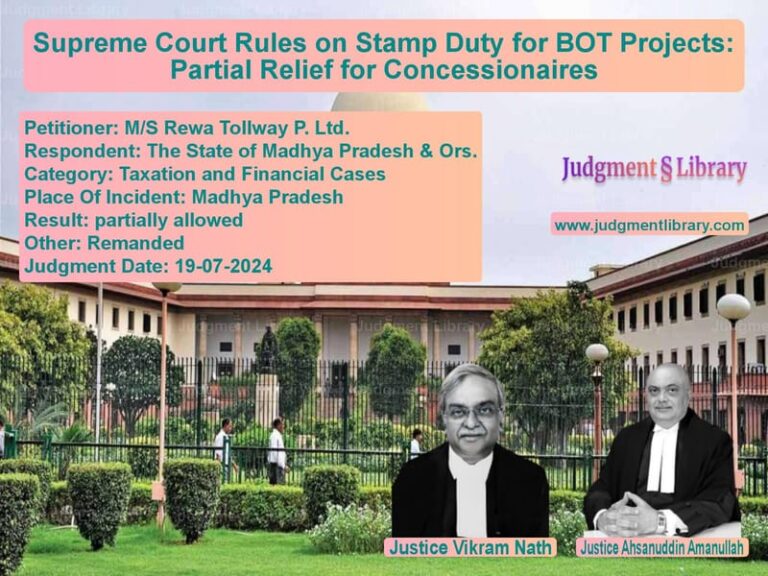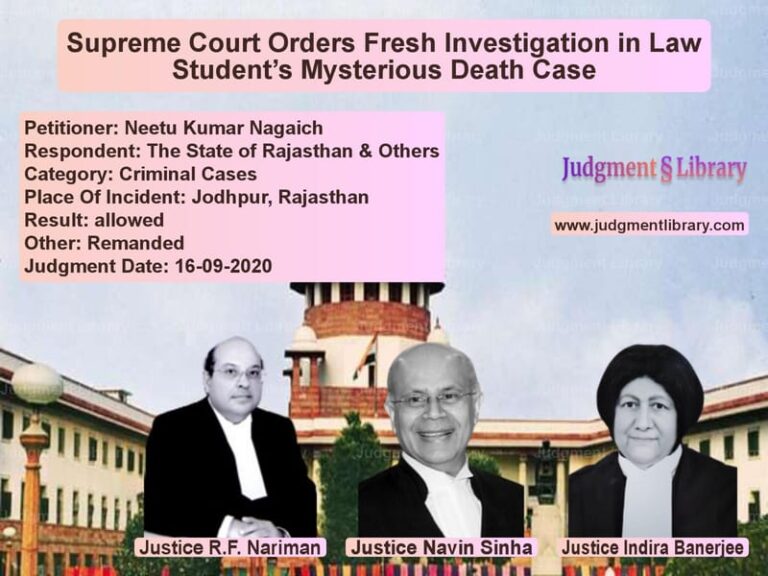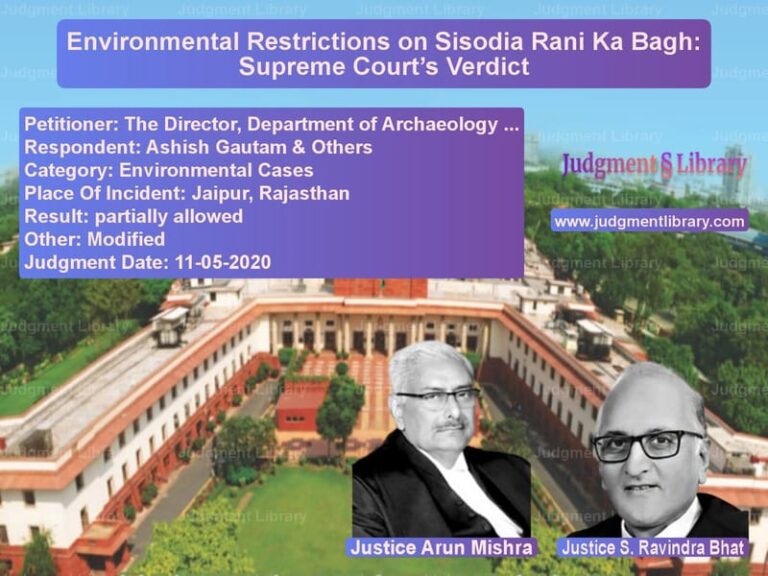Supreme Court Rules in Favor of Punjab National Bank in Insolvency Case
The Supreme Court of India, on August 30, 2022, delivered a significant judgment in the case of Punjab National Bank vs. Vijay Sitaram Dandnaik & Anr.. This case centered on the applicability of the Limitation Act in insolvency proceedings under the Insolvency and Bankruptcy Code, 2016 (IBC). The key question before the Supreme Court was whether the claim of Punjab National Bank (PNB) was time-barred due to the expiration of the limitation period.
The Supreme Court set aside the order of the National Company Law Appellate Tribunal (NCLAT), which had dismissed PNB’s insolvency petition, ruling that the claim was not barred by limitation. This judgment clarified the application of limitation laws in financial recovery cases under the IBC.
Background of the Case
Punjab National Bank (PNB) had filed a petition under Section 7 of the IBC against M/s Jailaxmi Sugar Products Pvt. Ltd., a corporate debtor that had defaulted on its loan obligations.
PNB argued that:
- The bank had sanctioned term loans to the corporate debtor in 2010 and 2011.
- The corporate debtor defaulted on the repayment, and the loan account was classified as a Non-Performing Asset (NPA) on March 31, 2013.
- A demand notice was issued under the Securitisation and Reconstruction of Financial Assets and Enforcement of Security Interest (SARFAESI) Act on April 30, 2013.
- The corporate debtor had executed Balance and Security Confirmation Letters in 2014 and 2017, acknowledging its debt.
- PNB, along with Union Bank of India, had initiated a parallel legal proceeding before the Debt Recovery Tribunal (DRT), which ruled in their favor on November 1, 2016, directing the debtor to pay Rs. 45 crore plus interest.
- The total outstanding amount had grown to Rs. 108 crore by August 13, 2019.
Based on these facts, PNB filed an insolvency petition before the National Company Law Tribunal (NCLT) in October 2019, seeking the initiation of insolvency proceedings against the corporate debtor.
NCLT’s Decision
The NCLT admitted PNB’s petition and initiated the Corporate Insolvency Resolution Process (CIRP) against M/s Jailaxmi Sugar Products Pvt. Ltd.
Appeal Before NCLAT
One of the promoters of the corporate debtor, Vijay Sitaram Dandnaik, challenged the NCLT’s order before the NCLAT, arguing that:
- The insolvency petition was barred by limitation since it was filed more than six years after the loan default.
- The corporate debtor had been ordered to be wound up by the Bombay High Court in January 2018, making the insolvency petition untenable.
- The Balance and Security Confirmation Letters issued in 2014 and 2017 could not be used to extend the limitation period.
The NCLAT ruled in favor of the respondent and set aside the NCLT’s order, dismissing PNB’s insolvency petition.
Key Issues Before the Supreme Court
- Whether the acknowledgment of debt through balance confirmation letters extended the limitation period.
- Whether the insolvency petition was filed within the three-year limitation period prescribed under the Limitation Act.
- The impact of the winding-up order passed by the Bombay High Court on the IBC proceedings.
Arguments from the Petitioner (Punjab National Bank)
PNB’s counsel argued:
- The limitation period for filing an insolvency petition should be calculated from the latest acknowledgment of debt and not from the date of the original default.
- The debtor had signed Balance and Security Confirmation Letters in 2014 and 2017, acknowledging its liability, thereby extending the limitation period.
- The Bombay High Court’s winding-up order did not prevent PNB from initiating CIRP under the IBC.
- The decision of the Debt Recovery Tribunal (DRT) in 2016 reaffirmed the debt, making the insolvency petition valid within the limitation period.
Arguments from the Respondent (Vijay Sitaram Dandnaik & Anr.)
The respondent argued:
- The original loan default occurred in March 2013, and the three-year limitation period expired in March 2016.
- The confirmation letters issued in 2014 and 2017 were invalid for extending the limitation period.
- The petition under Section 7 of the IBC was filed only in 2019, well beyond the prescribed limitation period.
- Since the Bombay High Court had ordered winding up in 2018, no further insolvency proceedings under the IBC could be initiated.
Supreme Court’s Observations
1. Applicability of the Limitation Act
The Supreme Court observed:
“The limitation period for initiating insolvency proceedings under the IBC is three years from the date of default, as per Article 137 of the Limitation Act. However, an acknowledgment of liability under Section 18 of the Limitation Act extends the limitation period.”
2. Acknowledgment of Debt
The Court ruled:
“The Balance and Security Confirmation Letters issued in 2014 and 2017 constitute valid acknowledgments of debt under Section 18 of the Limitation Act, thereby extending the limitation period.”
3. Impact of the Winding-Up Order
The Court clarified:
“The existence of a winding-up order does not bar a financial creditor from invoking the provisions of the IBC. The IBC is a beneficial legislation aimed at reviving corporate debtors.”
Final Judgment
The Supreme Court ruled in favor of Punjab National Bank, stating:
- The insolvency petition was not barred by limitation.
- The acknowledgment of debt in 2017 extended the limitation period.
- The decision of the NCLAT was set aside, and the order of the NCLT admitting the insolvency petition was restored.
Implications of the Judgment
This ruling has significant implications:
- Strengthens creditor rights: Financial institutions can initiate insolvency proceedings based on valid debt acknowledgments.
- Clarifies limitation rules: Acknowledgment of debt extends the limitation period for filing insolvency petitions.
- Boosts the insolvency framework: Ensures that corporate debtors cannot avoid liability by delaying proceedings.
Conclusion
The Supreme Court’s ruling in Punjab National Bank vs. Vijay Sitaram Dandnaik sets an important precedent in insolvency law. By confirming that debt acknowledgment can extend the limitation period, the Court has reinforced the rights of financial creditors while ensuring that insolvency proceedings remain an effective tool for debt recovery.
Petitioner Name: Punjab National Bank.Respondent Name: Vijay Sitaram Dandnaik & Anr..Judgment By: Justice S. Abdul Nazeer, Justice V. Ramasubramanian.Place Of Incident: Bombay High Court.Judgment Date: 29-08-2022.
Don’t miss out on the full details! Download the complete judgment in PDF format below and gain valuable insights instantly!
Download Judgment: punjab-national-bank-vs-vijay-sitaram-dandna-supreme-court-of-india-judgment-dated-29-08-2022.pdf
Directly Download Judgment: Directly download this Judgment
See all petitions in Bankruptcy and Insolvency
See all petitions in Company Law
See all petitions in Corporate Governance
See all petitions in Debt Recovery
See all petitions in Judgment by S. Abdul Nazeer
See all petitions in Judgment by V. Ramasubramanian
See all petitions in allowed
See all petitions in Modified
See all petitions in supreme court of India judgments August 2022
See all petitions in 2022 judgments
See all posts in Corporate and Commercial Cases Category
See all allowed petitions in Corporate and Commercial Cases Category
See all Dismissed petitions in Corporate and Commercial Cases Category
See all partially allowed petitions in Corporate and Commercial Cases Category







